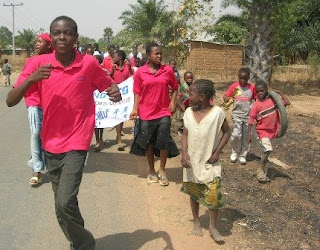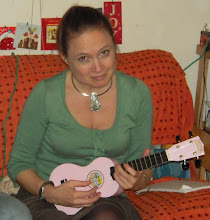My colleague Edi, who coaches the parliamentarians on their duties and workplans, asked if I could give them a short introductory speech before they set off from Fantsuam’s Knowledge Resource Centre (KRC) armed with identical red shirts, banner and marching band.
So with 5 minutes’ notice I tried to put some words together.
So with 5 minutes’ notice I tried to put some words together.

Now whilst I feel a touch embarrassed quoting Whitney Houston in any sort of public speaking, I think that the words that came quickly to my head, really meant something to me. So here they are:
People say that things are easier to say than to do.
"No to child abuse" – is four short words. What we are doing today, and in FACC, is not only to communicate these words to the community and to help them to understand what these four words mean, but try and show why they are important to the community.
Children are the future: Whitney Houston was not the only person to have said this but she certainly popularised it and I think there is real truth in the first few words of her song Greatest Love of All:
“I believe the children are our future, Teach them well and let them lead the way
Show them all the beauty they possess inside, Give them a sense of pride to make it easier”
Show them all the beauty they possess inside, Give them a sense of pride to make it easier”
"Child abuse" can be defined as causing or permitting any harmful or offensive contact on a child's body; and, any communication or transaction of any kind which humiliates, shames, or frightens the child. However some organisations go further to claim that “any act or omission, which fails to nurture or in the upbringing of the children” amounts to child abuse.
Our parade today and the work of FACC is about protecting the children of Bayan Loco and the local area. But it is also about laying the foundations of a strong future for the community.
The rest of this blog will be pictures – pictures to show our parade, and pictures of the children from the community who joined the parade. Pictures of the adults of the community who saw our parade, and I hope, understood at least part of the message on our banner.
But there are also pictures of the community itself, and its environment. Pictures which show why Bayan Loco needs a better, brighter future. Hopefully one that its children, unabused and empowered, can help deliver.
The procession starts off in Fantsuam Close
 Turn right out of Fantsuam Close and Edi's already looking at the directions...
Turn right out of Fantsuam Close and Edi's already looking at the directions...

 Turn right out of Fantsuam Close and Edi's already looking at the directions...
Turn right out of Fantsuam Close and Edi's already looking at the directions...
 Still going strong through Zikpak; below - holding up the 'traffic' as we cross the road toward Ungwa Masara
Still going strong through Zikpak; below - holding up the 'traffic' as we cross the road toward Ungwa Masara Clapping to the beating drums
Clapping to the beating drums

And they're not the only ones.... tomato sellers, welders...
Grinders, a local grocery store
A food seller preparing lunch, brickmakers making the most of the local earth
The gaiya ('gift of labour') road gang dig a ditch in preparation for the coming rains as the children gambol past
But after two hours under the hot midday sun everyone's pleased to be on the journey home
Small children take advantage of rides - big and small.
Turning the final corner into Fantsuam Close and the dusty end is in sight with the promise of jolof rice and kono drink for all participants!
But not before the speech:
A large part of the parliamentarians’ advocacy work is to influence the State and local governments: to adopt the Rights of the Child Act (not yet ratified by the Kaduna State government) and to ensure that the commitment to Universal Basic Education becomes a reality.
The Special Advisor to the Chairman, Jema’a Local Government Area, Mr Gibson Bala was invited by the Parliamentarians to address the parade today. Unfortunately he only sent his representative, a common occurrence in Nigerian politics.
However, rest assured that his words were taken on board. Well at least the children (for once) found the representative more interesting than the batuari......


Afterword:
I have been helping to put together the latest FACC newsletter and have just been handed the following text from Joel Moses, Speaker of the Kafanchan Children’s Parliament.
I join FACC due to what I have been seeing happening with my colleagues which are the children living in the community, also Kaduna State at large: which children have been denied their basic rights and also accusing them of being witches and wizards and denied them basic education. So for that I want to see an end to these critical problems.
My purpose is that the Gold must be worn. In which all children must be treated in the right way and also to see that they attend what we called the Universal Basic Education, for the benefit of our country. But I want you to know that we cannot do all these without the Government assisting because children are the light of the nation.
What we are really planning for the next months is to see how we can reach out to schools and churches which I definitely know God will lead us through. And I also cry that the Government should see us into all these activities.
Thank you, Joel Moses.























































